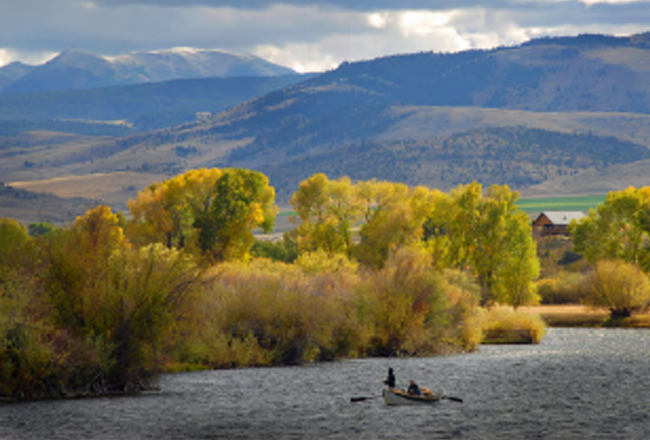MyFWP
Have you set up your MyFWP account?
- Tap harvest data by district and species
- Track your points and permit status
- Purchase licenses and apply
- Get detailed river access information
- Receive date reminders and updates by email


Sign up to receive email or text notifications about important hunting and fishing news and announcements.
Regulations for upcoming seasons are posted online throughout the year. Black Bear regulations are typically posted late February.
Black Bear Management Units (PDF)
Note: This map is intended as a guide. Please refer to the legal descriptions in the hunting regulations for actual boundaries.
There is a mandatory 48-hour reporting requirement for all successful black bear hunters.
Region 1 (Northwest Montana) Only
For black bears harvested within Region 1, physical inspection of a harvested black bear is not required. Successful Region 1 hunters must submit two premolar teeth from harvested black bears and deliver them to a FWP office within 10 days, either in person or by mail (postmarked within 10 days).
Submission form (PDF)
Within 10 days of harvesting a black bear, the successful hunter must present to a Montana FWP official the complete bear hide and skull for the purpose of inspection, tagging and possible removal of a tooth (for aging). The hide and skull must be presented in a condition that allows full inspection and tooth collection (i.e., unfrozen). Any hide or skull not presented or registered to FWP personnel within 10 days of harvest is subject to confiscation.
In Bear Management Units with a harvest quota (BMUs 510, 520, 600 & 700), when a hunting season quota is reached or approached, the black bear hunting season in that district will close.
Black bear harvest quota status information may be obtained:
By calling 1-800-385-7826 or 406-444-1989 for statewide information
By checking the online harvest quota page
Launch maps, obtain legal descriptions, regulations, and statistics all in one place.
A resident hunter with a valid Black Bear License may lawfully chase black bears with hounds during the spring hound season in any valid hunting district or management unit during the period that unit is open to hound hunting or chasing.
Hound hunting and training is prohibited in occupied grizzly bear habitat in BMUs 100, 101, 103, 104, 110, 120, 121, 122, 123, 130, 140, 141, 150, 170, that portion of 200 that includes the Ninemile watershed north of I-90, 216 east of the Granite/Ravalli county line, 280, 290, 300 west of I-15, 301 west of I-15 and HWY 69, 309, 317, 341, 400 north and west of I-15/Hwy 87 between Helena and Fort Benton, west of Hwy 223 between Fort Benton and Hwy 2 at Chester, south of Hwy 2 between Chester and I-15 at Shelby, and west of I-15 between Shelby and the Canadian border, 510 West of Hwy 310, 520.
A resident who possesses a Class D-3 Resident Hound Training License may pursue black bears with a dog or dogs during a training season from the end of the spring season for black bear through June 15 of that year as authorized by the commission (MCA 87-6-404(4)).
Authorized black bear hunting and training hours begin one-half hour before sunrise and end one-half hour after sunset.
It is prohibited for a dog owner or black bear hunter to release dogs on a black bear, or allow dogs to chase a black bear, or hold a black bear at bay during any period of the day or year when the season is not open to hunting or chasing black bears. Legitimate attempts to retrieve loose dogs after legal hunting hours does not constitute a violation of this rule.
Persons using hounds to hunt are required to have a valid Resident Black Bear License if hunting or chasing during the black bear hunting season, or a valid Class D-3 Resident Hound Training License during a training season from the end of the spring season for black bear through June 15 of that year as authorized by the commission. Nonresidents must also have a Nonresident Hound License during the hunting or training season if they are using dogs.
The holder of a Nonresident Class D-4 Black Bear Hound License may not assist another person in the pursuit of a black bear for harvest. Any area restrictions on the Black Bear License and the Nonresident Black Bear Hound License both apply as well as quota restrictions in quota areas.
While hunting with or training hounds, the dogs must wear tracking collars with the ability to send GPS location nformation and receive transmissions from hound handler so that the dogs may be electronically recalled and the hound handler’s receiver must be able to receive GPS location data from the collars.
It is unlawful to harvest/take black bear cubs. Cubs are defined as bears less than one year old.
It is unlawful to harvest/take a female black bear with cubs.
These dates are provided only as a general reference. Check current regulations or use FWP's online Hunt Planner for specific dates.
Spring: Apr. 15 - May 31 or June 15
Spring Hound Training: May 26 - June 15
Archery: Sept. 6 - Sept. 14
Fall: Sept. 15 - Nov. 30
In Bear Management Units with a harvest quota (BMUs 510, 520, 600 & 700), when a hunting season quota is reached or approached, the black bear hunting season in that district will close.
Black bear harvest quota status information may be obtained:
By calling 1-800-385-7826 or 406-444-1989 for statewide information
By checking the online harvest quota page
Availability
This license is available Over the Counter.
Deadline
N/A
Availability
This license is available via Special Drawing.
Deadline
March 25
A hunter may purchase only one black bear license over the counter per year.
Hunters must show proof of having passed a free bear identification test before purchasing a black bear license.
Fees:
Resident: $19
Nonresident: $350
Fees:
Resident: $19
Nonresident: $350
Details: A bow and arrow license, plus the proper hunting license is required during black bear archery-only season or to archery hunt black bear in an Arch-Equip only area or hunting district.
Fees:
Resident: $10
Nonresident: $10
Details: This license entitles the license holder to use a dog or dogs to aid in chasing black bears in any portion of the state open to hound hunting during the hound training season from May 26 – June 15. Hound hunting and training is prohibited in occupied grizzly bear habitat in BMUs 100, 101, 103, 104, 110, 120, 121, 122, 123, 130, 140, 141, 150, 170, that portion of 200 that includes the Ninemile watershed north of I-90, 216 east of the Granite/Ravalli county line, 280, 290, 300 west of I-15, 301 west of I-15 and HWY 69, 309, 317, 341, 400 north and west of I-15/Hwy 87 between Helena and Fort Benton, west of Hwy 223 between Fort Benton and Hwy 2 at Chester, south of Hwy 2 between Chester and I-15 at Shelby, and west of I-15 between Shelby and the Canadian border, 510 West of Hwy 310, 520. The hound training license is available over the counter to resident Conservation License holders 12 years of age or older or who will turn 12 before or during the season for which the license is issued.
Fees:
Resident-only: $5
Details: The 2021 Legislature expanded the ability for the commission to authorize hound hunting, and nonresidents are now allowed to pursue black bears with hounds during hunting seasons or hound-training seasons if they obtain a Class D-4 Nonresident Hound License. To apply for a Nonresident Hound license, a nonresident must already hold a black bear license. The holder of a Nonresident Class D-4 Black Bear Hound License may not assist another person in the pursuit of a black bear for harvest. Any area restrictions on the Black Bear License and the Nonresident Black Bear Hound License both apply as well as quota restrictions in quota areas. The deadline to apply is March 25.
Fees:
$250
In Bear Management Units with a harvest quota (BMUs 510, 520, 600 & 700), when a hunting season quota is reached or approached, the black bear hunting season in that district will close.
Black bear harvest quota status information may be obtained:
By calling 1-800-385-7826 or 406-444-1989 for statewide information
By checking the online harvest quota page
To view annual harvest reports and more information, click here.
Hunters must show proof of having passed a free bear identification test before purchasing a Black Bear license.
Trichinellosis, also called trichinosis, is a disease that people can get by eating raw or undercooked meat from animals infected with the microscopic parasite, Trichinella. Infection occurs commonly in certain wild carnivorous animals such as bear or cougar, or omnivorous animals such as domestic pigs or wild boar.
FWP recommends that all bear and lion meat be thoroughly cooked before consumption by humans or pets. For hunters who still desire Trichinella testing, they may send a tissue sample to the Montana Department of Livestock’s diagnostic lab.
Learn more about testing and trichinosis by downloading the Trichinella Information Sheet (PDF)
Visit the Centers for Disease Control and Prevention website for more info, or call the FWP Lab at (406) 577-7882.
Black bears reside across most of Montana. Grizzly bears reside mostly in western Montana but are increasingly roaming into areas where they have not occupied for decades.
All bears are potentially dangerous. The overwhelming majority of bear encounters do not involve conflict. The majority of human-bear conflicts involve bears protecting their young or a food source.
Black bears in Montana are managed as a game animal regulated by seasons.
Have you set up your MyFWP account?

